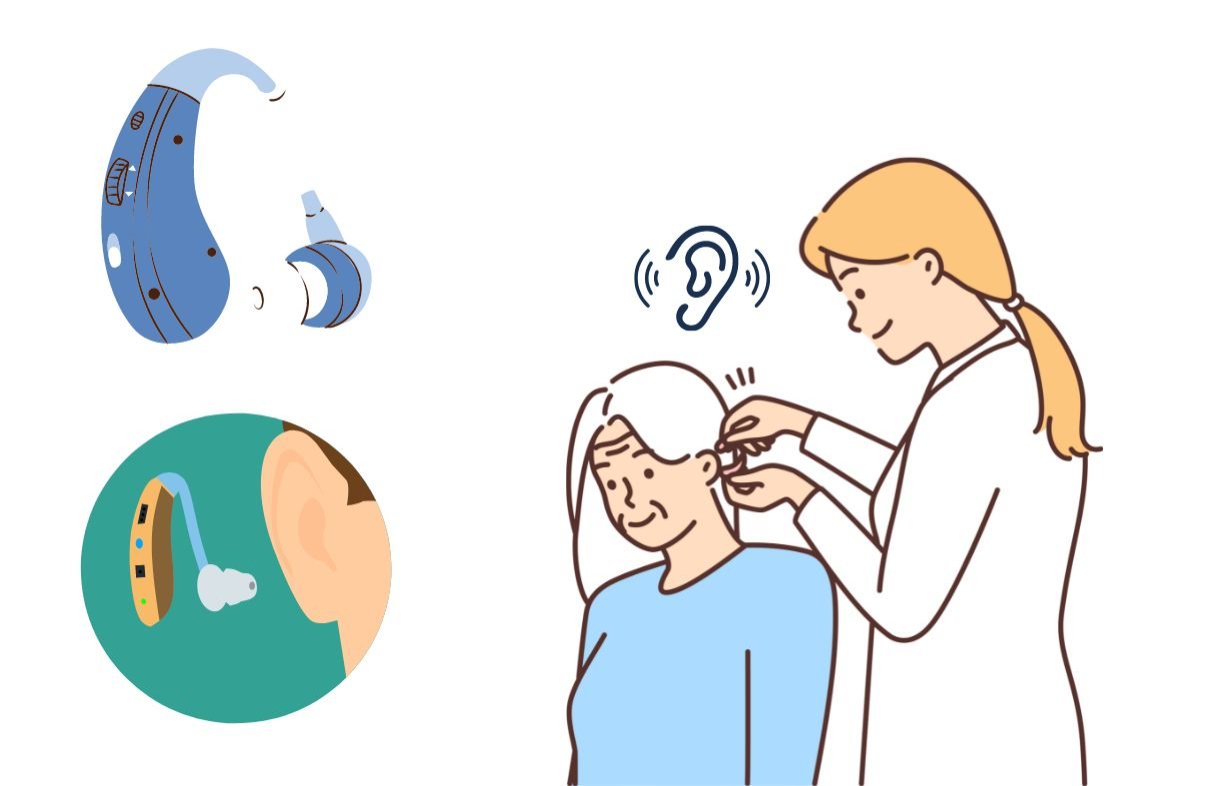Unlock the Sounds of Life: Your Ultimate Guide to Choosing the Perfect Hearing Aid

The Ultimate Guide to Hearing Aids: Unlocking the Secrets to Crystal-Clear Sound
Introduction
Hearing loss is a prevalent issue that affects millions of people worldwide, diminishing their quality of life and communication abilities. Thankfully, hearing aids have emerged as a groundbreaking solution, offering hope to those facing hearing challenges. As technology advances, the diversity and effectiveness of hearing aids have improved, providing users with a wide range of options to address their specific needs. In this comprehensive guide, we will explore the world of hearing aids, from their history and types to how they work, and offer invaluable insights for choosing the perfect hearing aid. By the end of this article, you'll be equipped with the knowledge you need to make an informed decision and find the ideal hearing aid that caters to your hearing requirements.
1. Understanding Hearing Loss
Before delving into the specifics of hearing aids, it's essential to understand hearing loss and its various causes. Discuss the importance of early detection, signs of hearing loss, and the impact it can have on one's life.
2. The Evolution of Hearing Aids
Take readers on a journey through the history of hearing aids, from the humble beginnings of ear trumpets to the revolutionary digital devices of today. Highlight key technological advancements that have shaped modern hearing aids.
3. Types of Hearing Aids
This section will explore the different types of hearing aids available in the market, including:
a. Behind-the-Ear (BTE) hearing aids
b. In-the-Ear (ITE) hearing aids
c. Receiver-in-Canal (RIC) hearing aids
d. In-the-Canal (ITC) hearing aids
e. Completely-in-Canal (CIC) hearing aids
f. Invisible-in-Canal (IIC) hearing aids
Discuss the advantages and disadvantages of each type, along with the ideal candidates for each category.
4. How Do Hearing Aids Work?
Explain the fundamental workings of hearing aids, detailing how they amplify sound and transmit it to the ear. Use simple language and visuals to aid comprehension.
5. Factors to Consider When Choosing a Hearing Aid
This section will provide a comprehensive list of factors to consider when selecting a hearing aid. This includes:
a. Degree of hearing loss
b. Lifestyle and activity levels
c. Budget considerations
d. Design and aesthetics
e. User-friendly features and controls
f. Connectivity options (Bluetooth, wireless compatibility, etc.)
6. The Future of Hearing Aids
Highlight the latest advancements in hearing aid technology and potential future trends. Discuss upcoming features that may shape the landscape of hearing aids.
7. Tips for Hearing Aid Maintenance
Explain the importance of proper hearing aid care and maintenance to ensure longevity and optimal performance. Offer practical tips and tricks for cleaning, storing, and handling hearing aids.
8. Hearing Aid Accessories
Discuss essential accessories that complement hearing aids, such as remote controls, rechargeable batteries, and smartphone apps for enhanced user experience.
Selecting the right hearing aid is a crucial decision that can significantly impact your quality of life. Here's a step-by-step guide to help you navigate through the process of choosing the perfect hearing aid:
1. Consult with a Professional Audiologist: Start by scheduling an appointment with a qualified audiologist. They will conduct a thorough hearing evaluation to assess the degree and type of hearing loss you have. The results of this evaluation will serve as the foundation for selecting the most appropriate hearing aid for your needs.
2. Determine Your Lifestyle and Hearing Needs: Consider your lifestyle, daily activities, and environments where you find it challenging to hear. Are you frequently in noisy environments, such as restaurants or social gatherings? Do you enjoy outdoor activities or sports? Understanding your specific hearing needs will guide you in selecting a hearing aid that suits your lifestyle.
3. Explore Different Hearing Aid Styles: There are various hearing aid styles available, each with its advantages and limitations. The common styles include:
- Behind-the-Ear (BTE): Fits behind the ear and is connected to an earpiece.
- In-the-Ear (ITE): Custom-made to fit within the outer ear.
- Receiver-in-Canal (RIC) or Receiver-in-the-Ear (RITE): Similar to BTE but with the receiver in the ear canal.
- In-the-Canal (ITC) and Completely-in-Canal (CIC): Smaller custom-made options that fit partially or completely in the ear canal.
- Invisible-in-Canal (IIC): Fits deep in the ear canal and is nearly invisible.
4. Consider Technology and Features: Hearing aids come with various technological features. Advanced digital hearing aids offer features like noise reduction, directional microphones, telecoil for phone compatibility, Bluetooth connectivity, and rechargeable batteries. Evaluate which features are essential based on your hearing needs and preferences.
5. Try Before You Buy: Many hearing care professionals offer the option to try different hearing aids before making a purchase. Take advantage of this opportunity to experience how each hearing aid feels and performs in real-life situations. Consider comfort, ease of use, and sound quality during the trial period.
6. Assess Budget and Insurance Coverage: Hearing aids can vary significantly in price, depending on their features and technology. Consider your budget and check if your insurance provides coverage for hearing aids. Keep in mind that investing in a high-quality hearing aid can lead to better long-term results and satisfaction.
7. Seek User Reviews and Recommendations: Look for user reviews and seek recommendations from friends or family members who use hearing aids. Hearing about the experiences of others can provide valuable insights and help you make an informed decision.
8. Evaluate Aftercare Services: Consider the aftercare services offered by the hearing care professional or the clinic. Regular maintenance, adjustments, and follow-up appointments are essential to ensure your hearing aid continues to perform optimally.
9. Trust Your Instincts: Ultimately, trust your instincts and choose the hearing aid that feels most comfortable and suitable for your needs. Openly communicate with your audiologist about your concerns and preferences.
By following these steps and working closely with your audiologist, you can find the perfect hearing aid that enhances your hearing abilities and improves your overall quality of life.
**Frequently Asked Questions (FAQ) about Hearing Aids**
1. **What are hearing aids?**
Hearing aids are small electronic devices designed to amplify and process sound for individuals with hearing loss. They are worn in or behind the ear and help improve hearing ability by making sounds louder and clearer.
2. **How do I know if I need a hearing aid?**
If you experience difficulty understanding conversations, often ask people to repeat themselves, have trouble hearing in noisy environments, or notice a decline in your overall hearing ability, it's essential to get your hearing tested by a professional audiologist.
3. **Are there different types of hearing aids?**
Yes, there are various types of hearing aids, including Behind-the-Ear (BTE), In-the-Ear (ITE), Receiver-in-Canal (RIC), In-the-Canal (ITC), Completely-in-Canal (CIC), and Invisible-in-Canal (IIC) hearing aids. Each type offers unique features and benefits.
4. **How do I choose the right hearing aid for me?**
Selecting the right hearing aid depends on factors such as the degree of hearing loss, lifestyle, budget, and personal preferences. It's crucial to consult with an audiologist who can recommend the most suitable option based on your needs.
5. **Will wearing hearing aids make my hearing worse?**
No, wearing properly fitted hearing aids will not make your hearing worse. In fact, using hearing aids can help preserve your remaining hearing by reducing the strain on your ears caused by untreated hearing loss.
6. **Do I need to wear hearing aids all the time?**
Initially, wearing hearing aids may require an adjustment period. However, it's essential to wear them consistently to get used to the amplified sounds and maximize their benefits. Over time, wearing hearing aids regularly becomes more comfortable.
7. **Can I wear hearing aids while talking on the phone?**
Many modern hearing aids offer telecoil or Bluetooth connectivity, allowing you to stream phone calls directly to your hearing aids. This feature enhances phone communication and minimizes background noise.
8. **Are hearing aids covered by insurance?**
Some insurance plans provide partial or full coverage for hearing aids. It's essential to check with your insurance provider to understand your specific coverage options.
9. **How long do hearing aids typically last?**
The lifespan of hearing aids can vary depending on the model, usage, and maintenance. On average, hearing aids can last between 3 to 7 years. Regular maintenance and care can extend their lifespan.
10. **Can hearing aids be repaired if they stop working?**
Yes, many hearing aids can be repaired by authorized service centers or manufacturers. It's best to contact the provider or the manufacturer for repairs and avoid attempting to fix them yourself.
11. **Will I hear normally with hearing aids?**
While hearing aids significantly improve hearing ability, they may not fully restore normal hearing. However, they can enhance your hearing experience and make it easier to communicate and engage with the world around you.
12. **Can children use hearing aids?**
Yes, children with hearing loss can benefit from using hearing aids. Pediatric hearing aids are specifically designed for children and are available in various styles and sizes suitable for different ages.
Remember, the information provided in this FAQ is for general knowledge purposes. For personalized advice regarding hearing aids and hearing health, it's crucial to consult with a qualified audiologist or hearing care professional.
-------------------------------------------------------------------------------------------------------------------------------------------------------------------------









Comments : 0